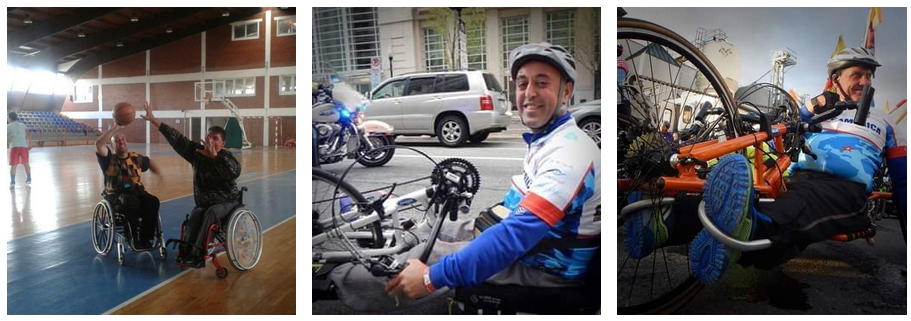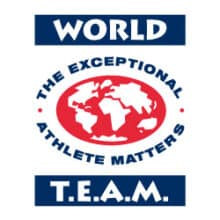A 2019 Face of America Gettysburg Team Kosovo Profile
Interview by Melissa Grappone || Text by Nicole Dauenhauer
In the city of Vushtrri, just near the capitol of Kosovo, Pristina, Team Kosovo is gearing up for the World T.E.A.M. (WT) 2019 Face of America (FOA) cycling challenge. Their story, and how they came to take part in the America-based program—which brings more than 500 active and retired military service members, wounded warriors, and adaptive and able-bodied athletes together for a 112-mile trek from Washington, D.C., to Gettysburg, Pa.,—is unique.
Friends and colleagues, Besim Galica and Ali Zeqiri are equally committed to improving the overall quality of life for disabled people living in Kosovo. Both devoted advocates for the rights of their fellow disabled citizens, they serve in local government while also promoting the importance of adaptive sports as a way to enrich and expand the worlds of those within their community—and the world at large. Together, they comprise Team Kosovo.
At present, Galica and Zeqiri are endurance training in advance of the upcoming FOA challenge; Galica by riding from six to nine miles each day using makeshift equipment in lieu of the hand-cycle he does not presently own, and Zeqiri by walking every day on crutches for 30 minutes. Once they arrive in America, a few days prior to the challenge, they will continue practicing with hand-cycles lent to them by WT. Last year, WT extended an official invitation to Galica and Zeqiri to attend the 2018 FOA, an experience they found most rewarding. Their presence at this year’s sporting event is thanks, in part, to logistical funding made possible through the American Portfolios Foundation, Inc.—support that Galica and Zeqiri accept most humbly and with sincere thanks. “This generous gesture has made it possible for us to ride alongside U.S. service members, who represent the country that was instrumental in liberating Kosovo and helping us to rebuild our homeland,” states Galica.
FOA 2019 will mark Galica’s third WT challenge and Zeqiri’s second. Galica became aware of the non-profit organization through a Vietnam Veterans of America Foundation (VVAF) humanitarian mission just after the liberation of Kosovo. The VVAF “Life for Sport” campaign—led by Amy Farkas and Sarah Woren, among many other devoted activists—organized and facilitated sporting activities for the disabled population of Kosovo. Farkas and Woren asked Galica if he had an interest in taking part in such a challenge. “I responded very quickly, telling them it was my dream to visit America,” Galica recalls with enthusiasm. “Thereafter, I began the Visa process.” On Sept. 9, 2003, Galica participated in World T.E.A.M.’s three-day, 278-mile Face of America ride from New York City to Washington, D.C.; it was the first time he had ever used a hand-cycle. He participated once again in 2018, this time joined by his close friend and colleague Zeqiri. “Those were some good days that will never be forgotten—visiting Washington, D.C., Arlington and Gettysburg, along with Ali,” he reminisces. “There was so much support from everyone for Team Kosovo during the ride, for which we are very grateful.”
Galica and Zeqiri’s paths led to one another through very common threads. As fate would have it, both became disabled when they were children. Galica suffered a catastrophic injury at the age of 10 in a car accident that involved his immediate family; and Zeqiri became paralyzed at three years old after contracting Polio. They each faced many difficult challenges growing up, previous to and during the Serbian occupation of Kosovo. With limited access to services for the disabled, especially during the war, they found ways to overcome certain obstacles. For Zeqiri, this meant traveling 30 miles to and from an elementary school suited for children with disabilities. Although his family’s economic situation was difficult, he continued his secondary education by studying from home with an agreement by a high school located in Croatia, successfully graduating in 1984.
Because he was injured at the age of 10, Galica was forced to stay at home and did not have the opportunity to attend school. “The entire Albanian population, myself included, dealt with many problems during the war,” he illustrates. In 1995, Galica began selling cigarettes in the streets of Vushtrri/Vuĉitrn City so that he could help his family make ends meet. “It was surprising to people that a person confined to a wheelchair could handle such work.” But that work was not without danger, for within just a few days on the job, he was harassed by the occupying police in Kosovo, who seized his cigarettes and took him in for questioning. During the police interrogation, he was mistreated, physically and verbally. “I told the officer that I was selling cigarettes to help my family and to cover my own needs.” While his interrogation was behind him, the war raged on ahead.
The Kosovo War, which arose amidst widespread conflict in the Balkans, officially began in the winter of 1998, lasting until the summer of 1999. After years of controlling Kosovo, which fueled ethnic tensions and erupted into acts of violence, the Federal Republic of (then) Yugoslavia and Serbian forces engaged in armed conflict with the Kosovo Liberation Army (KLA), a Kosovo Albanian rebel group. As the war escalated, and diplomatic attempts to resolve the crisis failed, NATO and the U.S. intervened.
Galica shares a harrowing wartime memory. “On April 1, 1999, at 1300 hours, after a week filled with bombings between the Serbians, NATO and the KLA, Serbian paramilitary policemen came to our door and confined us to our house as we listened to the hail of bombs outside. With them, we escaped to Macedonia, where we stayed for two-and-a-half months, until the end of the military intervention. When we returned, everything was destroyed.”
In June 1999, the war ended by treaty; Yugoslav and Serbian combatants withdrew from Kosovo, and the KLA was dissolved. Research conducted years later revealed the true numbers of lives lost. “During the 10 years of occupation, from 1989-1999, disabled people in Kosovo—as well as the entire Kosovar population—experienced extremely serious and dire conditions,” Galica asserts. “More than 13,500 civilians and approximately 1,500 KLA soldiers were killed during the war.” Furthermore, it is estimated that Yugoslav and Serbian forces were responsible for displacing somewhere between 1.2 million and 1.45 million Kosovo Albanians.* “The war totally destroyed our homeland, but thanks to the aid of countries like the U.S., we have been able to rebuild and start new lives in our state,” states Zeqiri. “We are forever grateful to NATO and the U.S. for helping to end the war,” adds Galica.
Despite their hardships, Galica and Zeqiri found purpose, logic and peace through advocacy work and participating in sports geared to adaptive athletes; often, those two paths would come to cross. “I love sports with all of my heart and see it as both a spiritual and health benefit,” states Zeqiri. “I’ve been involved in sports, and also chess, since I was a child. Gradually, I took up basketball.” Likewise, Galica took to basketball at the age of 20, at which time Kosovo was under total occupation from the Serbian state and not permitted to engage in activities, such as sports or seminars for the disabled. “We were extremely dismayed by this,” he shares. “So, we decided to hold workshops in the privacy of our homes and also at the offices of The Kosova Humanitarian and Charitable Society-Mother Teresa.” Today, and together, Galica and Zeqiri participate in the International Marathon of Pristina, which is held in Kosovo every year; as well as wheelchair basketball tournaments in the Balkan and European states, including Street Ball Kosova and the annual Memorial Tournament for Halit Ferizi, which honors the first president of HandiKos. They are active in all sports that are developed for disabled athletes, including ping pong and tennis.
About the same time he began partaking in basketball, Galica began to participate in activities for people with disabilities. Since the war, he has developed many seminars in cooperation with the HandiKos Association, an inclusive society with full recognition of the rights and equal opportunities of people with disabilities, to which he contributes his time on a regular basis. Galica also serves as vice president for Advocacy Club for Persons with Disability in Kosovo, where he organizes meetings and activities, including basketball tournaments, all with the goal of helping disabled people become more active participants in Kosovar society.
Zeqiri, too, transitioned into humanitarian work. “During the 1990s, I engaged with The Kosova Humanitarian and Charitable Society-Mother Teresa, which is jointly committed to people with disabilities. During the Serbian occupation of Kosovo, I helped to distribute aid to the disabled population in need, such as food and clothing,” states Zeqiri. “After Kosovo was liberated, I continued my activities and served as a representative of my village. I am one of five chairmen on my village council, which I do on a volunteer basis to improve conditions in all spheres of life for the residents to ensure the best living conditions.” His work involves organizing monthly meetings with residents and members of municipal and central institutions to discuss beneficial projects. “As an advocate for people with disabilities, I understand fully the difficulties encountered during and after the war.”
Although they are making progress in their fight for improving the rights of Kosovo’s disabled population, Galica and Zeqiri attest that there are many mountains to climb. “We still have a problem employing disabled workers, as well as providing proper transportation for our disabled population,” Zeqiri emphasizes. “The Prime Minister and Kosovar government can use the U.S. and Europe as models for improving the living conditions of disabled people.” Galica adds, “Even our hospitals lack many services for disabled patients; this is especially prevalent in Pristina. There is hope that the Ionian government will be of assistance in providing transport to medical facilities to support this population.”
In the intervening time between helping to solve these and other infrastructure issues that exist in a post-war society, Galica and Zeqiri will continue their mission—all while promoting the benefit of adaptive sports. With their two-day journey from America’s capital to the battlefields of Gettysburg on the horizon, Zeqiri leaves off with this firm and earnest objective. “I believe, due to our commitment, we have contributed to the promotion of sports for people with disabilities and will do so further through events like FOA and through our associations with organizations like WT and American Portfolios.”
World T.E.A.M.’s Face of America is annually supported through generous sponsorship and partnerships. Presented by American Portfolios, additional partners include American Airlines, Brioni, Booz Allen Hamilton, Cannondale, Capital One, Dell EMC, Devens Recycling Center, Flying Dog Brewery, ForeScout, KT Tape, Mt. Airy Bicycle Company, Navy Federal Credit Union, Penske Truck Rental, Pershing LLC, Sila Solutions Group, Spokes, and SUBWAY of the Walter Reed National Military Center.

Images (above, left to right): Galica and Zeqiri engaged in a game of wheelchair basketball; Galica, riding his hand-cycle, poses for a photo during the 2018 Face of America Gettysburg cycling challenge; Zeqiri, riding his hand-cycle, along the road at the 2018 Face of America Gettysburg cycling challenge.
Photographs courtesy of American Portfolios Financial Services, Inc., and Besim Galica.
* Reference: https://en.wikipedia.org/wiki/Kosovo_War



